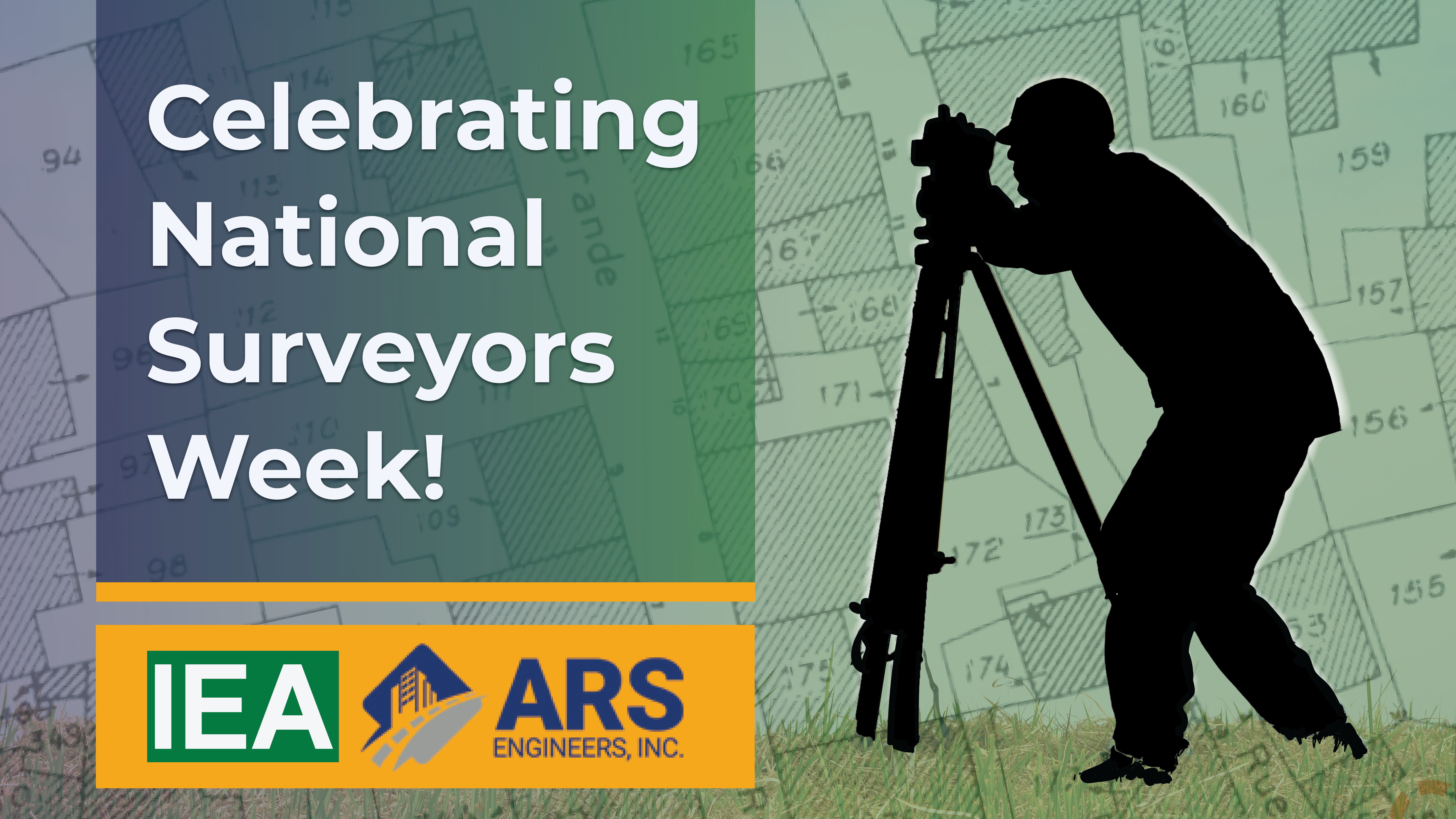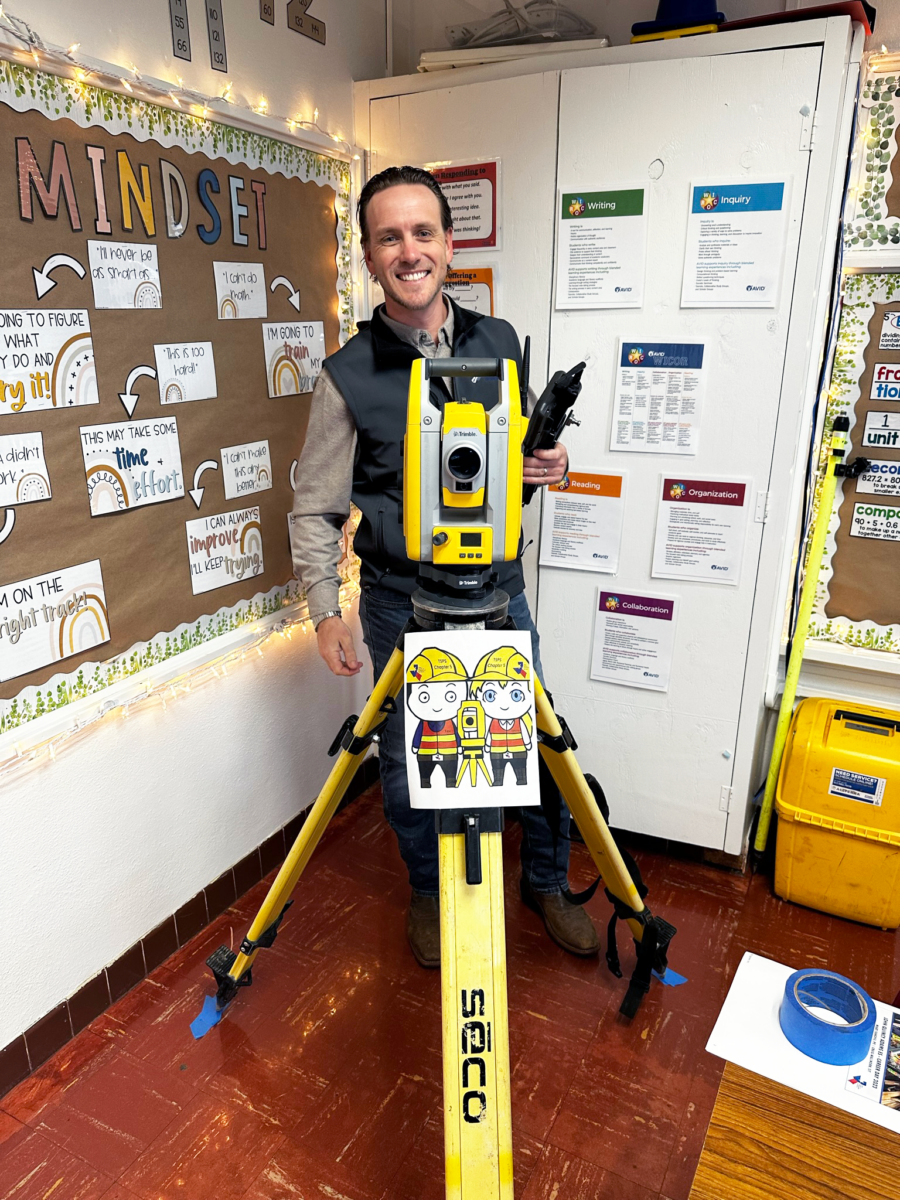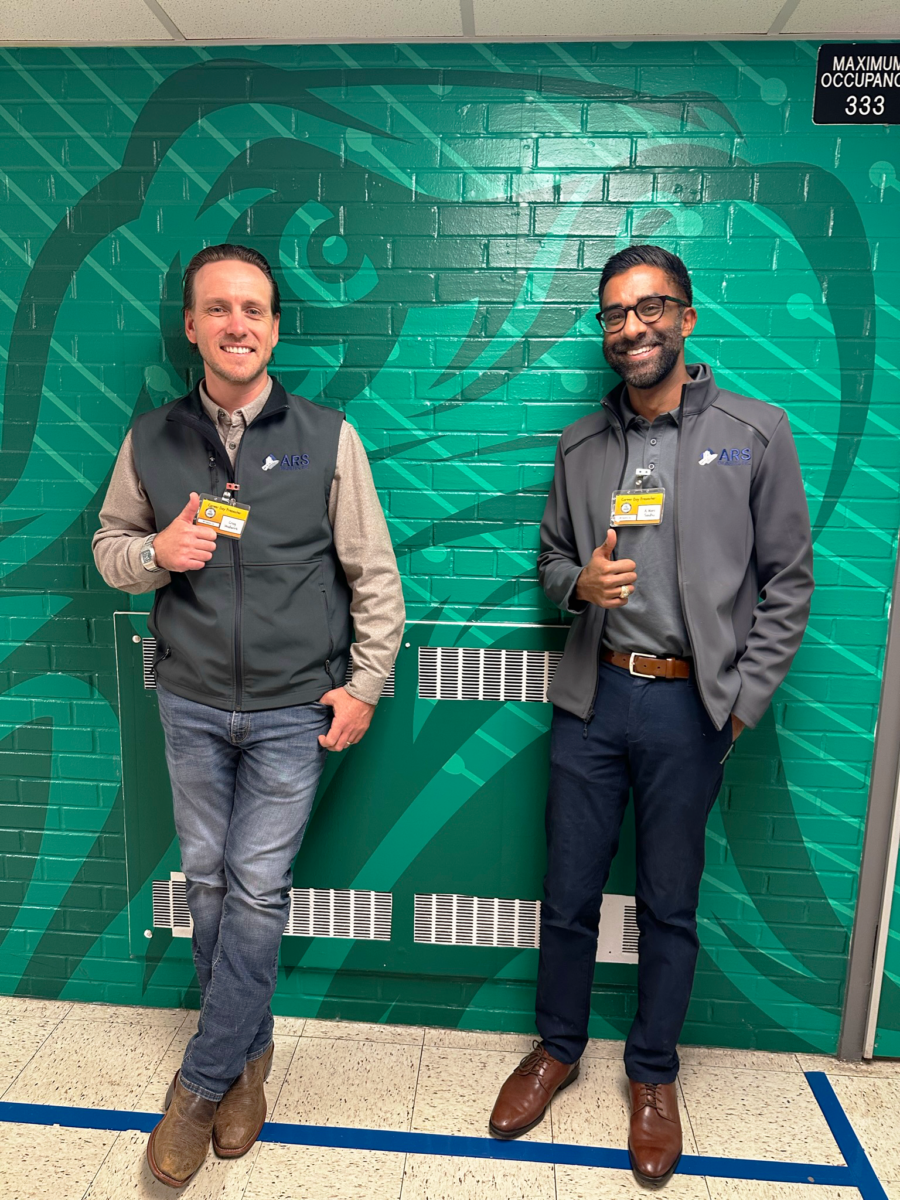Celebrating National Surveyors Week
IEA AND ARS STAFF REFLECT ON THE IMPORTANCE OF SURVEY WORK IN CIVIL ENGINEERING AND ITS PROMOTION AS A POTENTIAL CAREER PATH FOR YOUNGER GENERATIONS.
Land surveyors are key players in the Civil Engineering industry.
“Nothing happens without Survey,” said Mickey Marlow, PE, IEA Principal.
Established in 1984 by the President of the United States, National Surveyors Week is observed annually during the third week of March. Its purpose is to heighten public awareness of the work that land surveyors perform and the value it adds to our society.
These individuals are responsible for accurately recording geographical data by mapping and measuring plots of land for various reasons. These include the identification and establishment of property boundaries, providing accurate existing site information, and settling property disputes.
Without the completion of an accurate, high-quality survey, an engineer is likely to have a poor understanding of the potential physical or legal conflicts that exist within a project area.
Marlow notes that an engineer’s first line of defense on a project is a strong set of design plans, and accurate survey data is critical to ensuring its strength.
“Accuracy is key to any information gathered during the survey portion of a design. A high-quality survey can prevent a lot of headaches down the line. We [Civil Engineers] use the information gathered in these surveys to make informed judgments during the design phase. A bust in the survey could carry all the way through the design and even into construction if it goes unnoticed,” said Marlow.
These busts in the survey not only lead to time added to the project schedule, but additional costs to the client and poor use of taxpayer funds on public projects.
By assuring the features of a land area are properly documented, high-quality survey work leads to safer, more efficient designs for the public infrastructure we use daily.
Marlow, who began his career in the field, has done his fair share of survey work. He credits this experience as a key factor in broadening his understanding of the pieces that make up a solid project design, and how to effectively communicate with a project survey crew.
“To be a better engineer, you need to spend time in the field gathering survey data before you try to tell anyone else what is important,” said Marlow.
Marc Sandhu, PE, President of Carrollton-based firm ARS Engineers, Inc., agrees, citing his experience working onsite with a survey crew as a major part of his early career development.
“As a high school intern, my father [ARS’ founder Ayub R. Sandhu, PE, RPLS] did one of the best things he could have done to help me in my future career – he made me spend some time with a survey crew in the burning Texas summer heat. This time gave me a unique appreciation for exactly what it takes to create survey deliverables…if you’ve personally operated a data collector in 101-degree heat, you’re going to better understand how to make a reasonable and concise survey request to a field crew,” said Sandhu.
ARS is unique because it houses civil engineering, land surveying, and utilities departments who work in harmony to produce high-quality deliverables.
Sandhu’s father Ayub was both a PE and RPLS, and he had a distinct vision to create a survey department that works in harmony with the firm’s civil engineering department. He held a clear understanding of how critical it is to produce high-quality survey work in support of engineering designs.
“Boundary and topographic surveys are not treated as an afterthought or ancillary service at ARS; they are the very fabric from which our engineering designs are constructed,” said Sandhu.
He believes having an in-house survey department benefits ARS engineering staff because it allows knowledge to be easily shared between all departments.
This connection allows their engineers to see the “why” behind the surveying process and makes them well-informed of what a reasonable survey request is, how long the process can take, and what the deliverable will look like. They also understand basic surveying principles that affect their projects.
Additionally, their surveyors can see the “why” behind the engineering design process and which survey practices will best help the engineers do their jobs.
Investing in your Team
ARS’ Survey department is spearheaded by Dustin Davison, RPLS, who serves as their Director of Land Surveying. Davison’s involvement in the industry started early, with the drafting courses he took in high school. From there, he got his foot in the door by taking up work for a local survey company needing drafting assistance.
Davison now has 33+ years of experience, with over 9 years spent at ARS. When taking on the role of director in 2013, he saw it as a unique opportunity to have the freedom to construct a survey department in his own vision.
“ARS really gave me the opportunity to be able to put some prior plans I had into motion. Ayub Sandhu gave me the ability to do some things that I wanted, and he supported me in bringing key people over [to ARS] and the overall growth and expansion of the ARS Surveying Department,” said Davison.
For Davison, it’s clear that investment is a key part of his leadership framework. Most of the ARS Surveying Department staff have been personally recruited and trained by Davison as they were leaving high school.
“What sets him [Davison] apart as a leader is his ability to pick out young talented individuals, teach them about surveying from the ground up, and grow them into proficient and dedicated employees with a clear vision,” said Sandhu.
“Some of these guys are coming up on 14 or 15 years in the industry and we all still work together. If you take that initial investment in your personnel and train some guys while they’re young, then they help train the other people that we bring in,” remarked Davison.
This investment has resulted in a team Davison knows and trusts to complete the work they are assigned.
“I’d say the most important resource a Survey team can have is properly trained field personnel,” said Davison. “I don’t have to worry what they did before I open a drawing because 90% of the time, they’re doing what they have been taught, and [they know] how I expect it to be done.”
The Future of Survey
Specific numbers vary, but nationwide, the average individual working in a land survey position is estimated to be between 50 and 60 years old, meaning many of these professionals are set to retire soon.
According to the U.S. Bureau of Labor Statistic’s (BLS) annual Occupational Employment Statistics Survey, since 2000, the number of active land surveyors has shrunk from 52,750 to 43,710 – a 17.1% decrease. However, demand for survey professionals remains high, with the BLS estimating the number of available positions to increase 5% from 2022 to 2032. These positions are a great option for those looking to avoid student loan debt and spend time away from a desk in the outdoors.
Additionally, the average salary for a land surveyor in Texas is somewhere between $66,000 and $83,000, according to the BLS and Indeed.com. These numbers are expected to increase as the labor shortage for trade-based positions rises, demonstrating a lack of interest from younger workers.
According to several sources including Forbes, NPR, and PBS, it seems many point to the stigma the United States tends to place on pursuing trade-based positions versus obtaining a traditional college degree as a reason behind the decline of interest in trade work.
Educational Outreach
While these statistics far from prove that survey is a dying industry, they do pose the question of what can be done to foster more interest in the field from younger Americans.
It’s important to note that many schools nationwide fail to take the time to properly highlight existing opportunities for students as trade workers, leaving many unaware this work is an option for them.
To Sandhu, one potential solution is educational outreach.
“The Survey community must get the word out to young people about just how critical survey work is and how it affects the infrastructure within our communities. If the Engineering community is not unequivocally supporting this effort, we are failing the next generation. There is a huge push right now for STEM education initiatives with kids, but Surveying is rarely seen as part of this initiative. We must change this. ARS is doing our part by sending Engineers and Surveyors together to Elementary Career Days and teaching kids about how these professions work together to impact change,” said Sandhu.
Are you a surveyor interested in getting involved with the promotion of land survey as a career path?
The National Council of Examiners for Engineering and Survey (NCEES) offers opportunities to become a speaker for the organization as well as resources to help you perform your own outreach efforts. NCEES offers a Speaker’s Kit specifically designed to make it easy for you to get started. Help students and the public learn the value of licensed survey work by visiting the link below and filling out the request form to express interest in becoming a speaker or to receive an immediately downloadable Speakers Kit: https://ncees.org/outreach/.





